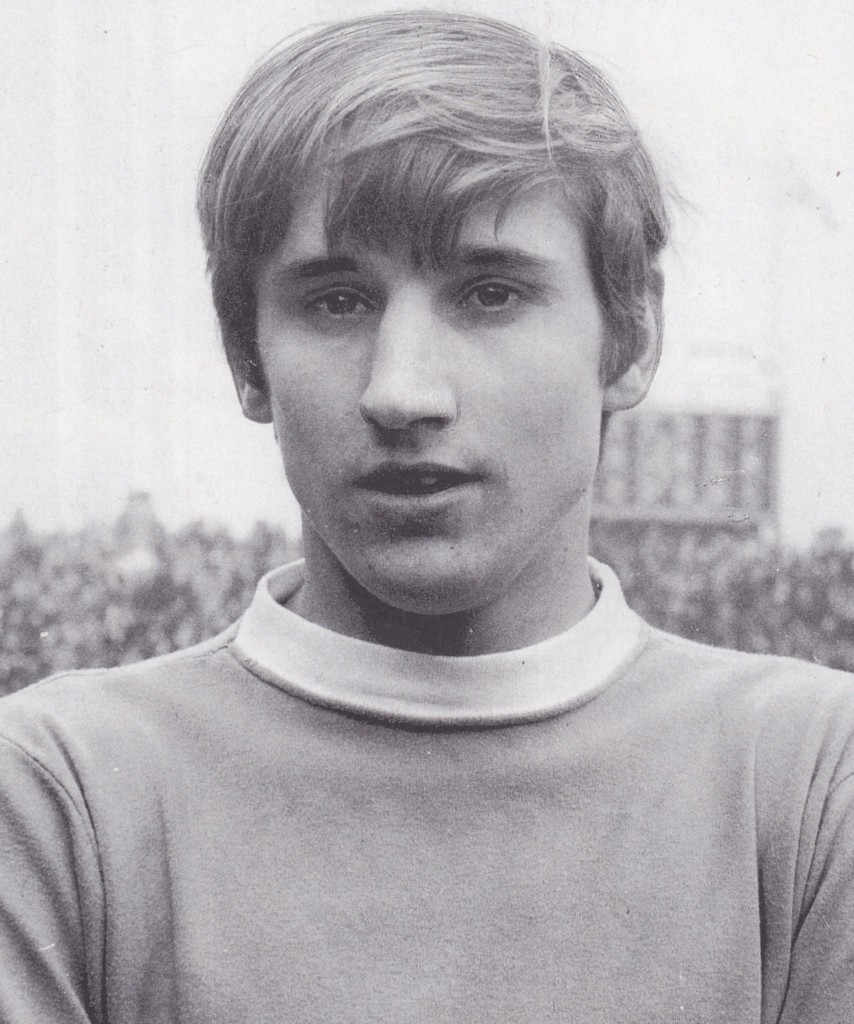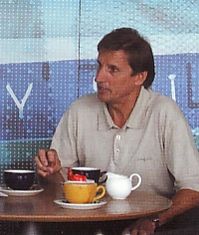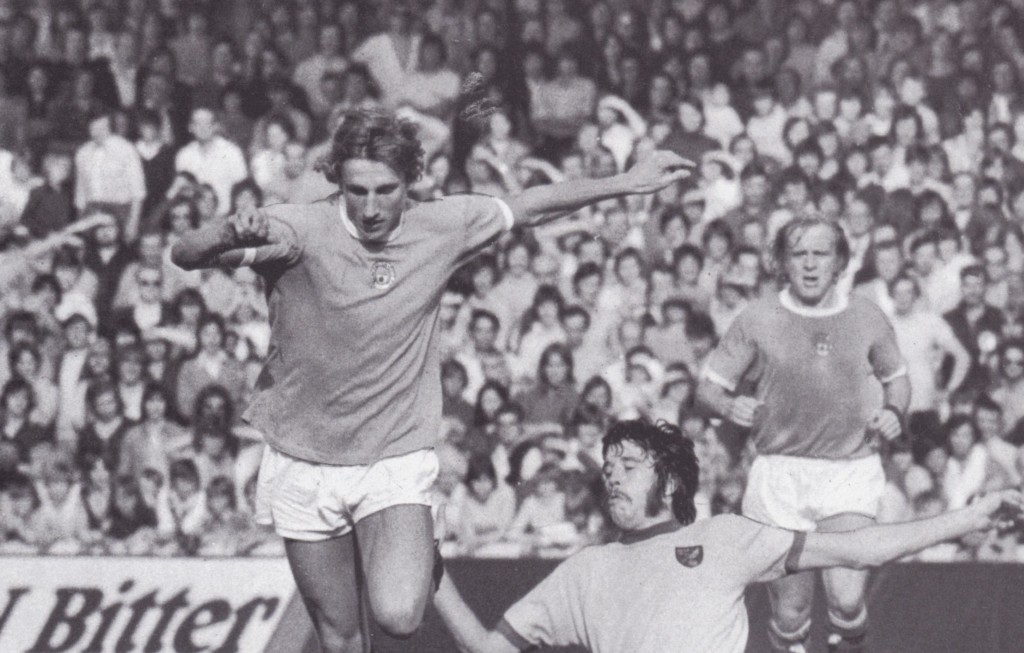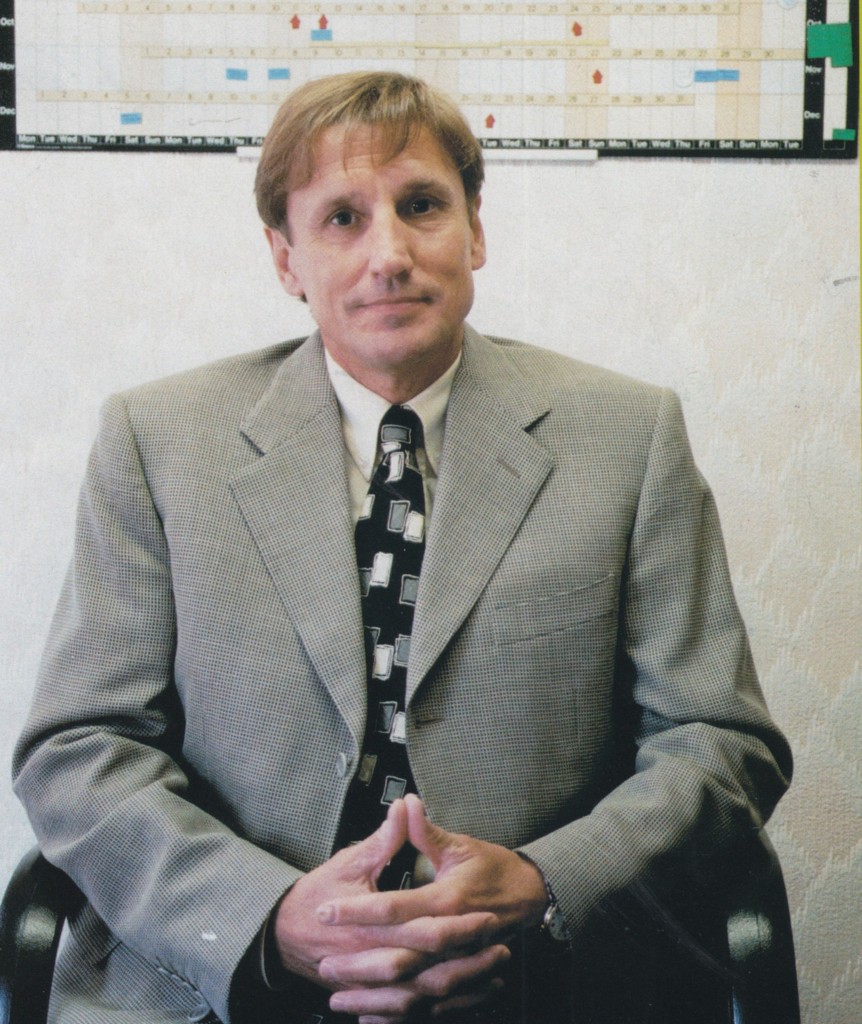
Winger who scored once in 41 League outings prior to joining Aston Villa in July 1974, He then played for Wrexham, Birmingham City, Bury, Witton, Runcorn, Altrincham and Macclesfield, since running his own corporate hospitality business in Hale.
AN INTERVIEW WITH FRANK CARRODUS FROM SEPTEMBER 2004

To start with can you tell me what your present day activities are? – I own my own corporate hospitality business in Hale. It’s something I’ve been doing for about 18 years. Initially, after my career ended I worked in financial services but I hated it, and I don’t think I was particularly suited to it either, whereas corporate hospitality is something I enjoy.
Moving back to your early life, how did your footballing career commence? – I went to Lymm Grammar School and enjoyed playing of course, and progressed to Heys Albion. I took part in a trial game at Altrincham behind closed doors and our side won. One thing led to another and I signed for Altrincham. l’d also had a spell in Blackpool’s ‘A’ team but the travelling was a problem, I couldn’t drive, and to be honest I wasn’t really progressing, so Altrincham suited me.
From Altrincham was your move to City a natural progression? – No, not at all. I think fate played a major part in my transfer. Malcolm Allison came to Altrincham to watch a couple of other players and he probably had no idea who I was. I came on as substitute and had one of those ‘once in a lifetime’ games. l couldn’t put a foot wrong. Afterwards Malcolm described me as ‘one of the best non-League prospects ever’ which, I have to say, I didn‘t really pay much notice to at the time. But over the next few weeks Malcolm came back to watch me, and City went on to sign me. I was 20 at the time and studying for my HND in Civil Engineering so City allowed me to sign on a part-time basis.

Looking at your career statistics, it seems you progressed rapidly at Maine Road. Was it as quick as it appears? – Yes, I guess it was. It was a bit of a dream come true because I went straight into the reserves in the November and made my first team debut in February. I cou|dn’t believe the rise and for some guys in the media it was a good story. I remember one headline, “From park to Portugal in 16 weeks”. I was named in the City squad for the ECWC tie with Coimbra which is where the Portugal bit came from.
So how did you handle the change personally? – I didn’t really think too much about it. I was busy with my studies and I loved playing so I just had to get on with it. I do remember thinking after I’d played my first reserve game that at least l’lI be able to tell my children that I played for Manchester City reserves, at the time that was the highest I expected to go. I wanted to go further of course, but hitting the reserves was a major landmark because, Iet’s face it, there’s not that many who even get that chance. So much became clear at City though. No one had ever told me that I had good stamina and that I was a good runner but at City I quickly realised that these were a couple of my major strengths. The athlete Derek Ibbotson trained us and I know we were by far the fittest team in the League. Before I came it was a major talking point and so when I realised I could more than hold my own stamina wise I started to feel I could achieve more in the game.
Do you remember much about your debut? – I think Mike Summerbee was injured so I was thrown in at the deep end for a 1-1 draw with Arsenal in February 1970. I know I didn’t let myself down and I think I had a decent game but in the weeks before I don’t believe I ever thought I’d be able to get into the team. I remember looking around and thinking about the star men at the Club and I know it was a great feeling to even be considered part of that squad. Funnily enough the week of my debut I also had to sit my HND exams so there was a lot for me to think about at the time.
You made a total of 6 League appearances (plus 1 as sub) that season, did you expect to eclipse that in 1970-71? – So much had happened that I don’t know how I felt. I guess I expected to appear more but don‘t forget the City squad was still very strong and they had just won the League Cup and ECWC without me. I made six appearances in ‘71 so the opportunity was about the same I suppose. Actually, the League Cup was a bit of a strange experience for me. I remember taking my seat in the stand ready to watch the match, and then I picked up the match programme. As I’m flicking through I spot the team Iine-up and read number 7, F Carrodus. I laughed to myself and wondered what Malcolm Allison had been up to!
So were you getting frustrated at the lack of opportunity? – Perhaps I should have been but at the time I still kept thinking my time would come. I also recognised that l’d not progressed on the training pitch. As I said before my stamina was good and general fitness was great, but once I’d finished my HND I went on full time training and that affected me. I expected to get much better but the reverse was true and I became drained. My body couldn’t take it at first and it took me two years to get to the level I needed and wanted to be at.
Your longest spell in the first team came during 1973-4 when you made a total of 16 appearances plus three as substitute. I take it that was a satisfying time for you? – It was a good time for me as I was at the right fitness level and determined to prove myself. Throughout the previous four years I’d had times when I did not think I would ever make it, but the games in ‘73-74 made me think that I could achieve something. I think if my career had ended before 1973 I would actually have felt disappointed. Once I’d tasted first team football I wanted it to last and I wanted to succeed. I believe it takes me some time to get going. I guess I’m a slow developer but once l get going I want to keep pushing myself forward. That’s true in business as well as football.
It seems that iust as your career was beginning to blossom the opportunity to shine at Maine Road was taken away. Is that a fair statement? – I was very disappointed not to be included in the 1974 League Cup final side, it shows you how things had developed that I was disappointed to be kept out of a side packed with quality players like Franny Lee, Rodney Marsh, Mike Summerbee, Colin Bell and the others! I saw the writing on the wall and knew I’d move on eventually. I didn’t want to go, of course.
Ron Saunders signed you for Aston Villa in July 1974. He’d also been your manager for part of the 1973-4 season at City. Since 1974 many people have suggested Ron was a tough task master and a difficult manager to work for at City, yet he brought great success to Villa. How did you rate him as a manager? – I have no doubt whatsoever that Ron Saunders was a great manager. He was tactically aware and, for me, a superb manager. At City he had been very tough on the players and the more senior, and more successful, players were treated no differently from the young hopefuls. In fact he was quite harsh at times. By the time he was at Villa he had learnt that you can’t treat all players the same. Some need discipline; some need a gentle word every now and then, and I think Ron realised that at City he hadn’t got the balance right. Certainly his man-management was much better at Villa. I enjoyed playing for him at both clubs and I also know that when Villa came in for me the fact he was manager helped. At the time Villa were in the Second Division and had only recently come out of Division Three, so it wasn’t as if I was going to a club that was destined for trophy success. Villa were certainly not an Everton or a City, so I had to be certain that it was the right move. Ron helped ensure it was.
At Villa the success did come. You played in two League Cup finals and was part of the side promoted in 1975. Presumably, this was a great time for you? – Definitely. The first season was our promotion season and although we struggled to Christmas, the second half of the season was fantastic. We reached the quarter-finals of the FA Cup; beat John Bond’s Norwich 1-0 in the League Cup final and won promotion as runners up to Manchester United. We’d actually beaten United 2-0 in February and I believe we’d have won the title had the season gone on for a couple more games. We were unstoppable towards the end and I remember our final match, away at Norwich, when we annihilated John Bond’s side 4-1. He couIdn‘t believe it, especially as myself, Bobby McDonaId and John Gidman scored. Norwich were also the third side promoted that season, so they’d not had a bad run themselves. People often talk about the money side of football today, especially after the Rooney transfer, but I can honestly say that money was not a motivating force at all. Clearly, we all wanted the best, but after the first League Cup final I remember us being sat in the bath and suddenly one of the players mentioned how much bonus we’d be getting for winning. It was an afterthought I suppose, and provided no motivation for us, winning the trophy and appearing at Wembley was much more important. I do think there are still some players around today who feel like that, but not as many as in the 70s.
After spending so much time on the fringes of City’s great side, how did you feel now you were a regular at Villa? – City had been the team in 1970, and then in 1975 I felt Villa had a team. Clearly there were a lot of great players spread across the clubs, but when a successful team is created its significance becomes greater than the sum of the individuals. I loved playing my part in ViIla’s great side. It was fantastic, but I also enjoyed being in the company of City’s great side in 1970. Like with City, the Villa side lasted for a few years and there were several major highlights. One of my favourites was when we played Liverpool in December 1976 and beat them 5-1. We were 5-0 up before half time against the UEFA Cup holders and eventual League Champions, FA Cup finalists, and European Cup winners!
A guy ‘phoned the club up from Australia to check the score and when he was told he started asking questions like ‘Did Liverpool have a full side’?’ and ‘Were the conditions poor?`. He kept going on until eventually he had nothing else to say. He just couIdn’t believe it and must have been stood there in Australia open-mouthed. Mind you there was another game against Liverpool which sticks out for me. Bonfire night 1977 and I scored at both ends, although Andy Gray was credited with my Villa goal. Now I need to see the facts about this but I have been told that my own goal is the answer to a trivia question popular in Liverpool at the time. It seems that goal was a major landmark, it was something like the 100,000th top flight goal apparently. I’ve never actually sat down to try and work it out but it seems that In Liverpool shortly afterwards pub quizzes and the like started to ask who scored the ‘whatever the record is’ goal. They’d give a clue that It was for Liverpool, and then my name would be given out as the answer. I‘d love to find out the truth of the record, if indeed it is a record, but I‘m just flattered to have been mentioned, even if it Is for an own goal!
We need John Motson to check on that one! You left Villa in 1979. How did the latter years of your career progress? – I went to Wrexham, but I’d started to have cartilage problems at Villa and had to move on. Actually, I remember being sat in the stand at Villa Park watching a game while injured and hearing a Villa fan say: “They can say what they like about Carrodus, but we’re missing him tonight.” I felt pretty pleased with myself until I started to wonder ‘what do they say about Carrodus?’
After Wrexham you were asked on to a tour of South Africa. What kind of experience was that? – I regretted going in the end, but we were told it was a multi-racial tour and that we’d be playing teams in Soweto and so on. In the end there were a few problems with the organisation of it all and we only played one match. When I was first approached to go I got a call from one of the organisers saying ‘you’re replacing MIario Kempes’. Can you imagine that, Carrodus replacing Kempesl When I got back to England I was out of work and so Ron Saunders called me and asked if I wanted to do some training with his new team, Birmingham City. At Birmingham I only played seven games before my knee went. So it wasn’t a good time for me.
You moved on to Bury and then after your League career ended you continued to play in non-League and in the City old boys team. Is this because you continued to love the game? – I don’t really enjoy watching football, but I do love playing. In fact I only stopped the other year because my knee problems are still there. For me it’s all about playing and I am delighted I had the chance to play for as long as I did.
Finally, you’ve had a great playing career but if you had the chance to play today instead of during the 70s and early 80s would you? – There’s no doubt in my mind that during the period I played there were more characters in the game. Just think about the great players at City, Colin Bell was the most gifted player I ever appeared with, and my team mates at Villa, Bobby McDonald, Andy Gray, John Gidman and the rest. It was a great time and much more enjoyable than it looks today. Obviously, the money’s better today and the medical treatment is a whole lot better, my cartilage problems would probably have been resolved immediately, but I truly enjoyed my playing career. I loved having the opportunity of being amongst the great players at City when I was there, and I loved being part of that wonderful Villa side. I wouldn’t swap any of that.
INTERVIEWED BY GARY JAMES – PUBLISHED IN THE CITY PROGRAMME 11TH SEPTEMBER 2004

.



I just loved your feet kid and the way could weave . Even done a project on you at school thinking at the time you was the most famous person I had seen,other kids done the pope the queen but na how wrong was they Frankie boy all day
I remember playing against you on a muddy field in Sale long after you retired, we both played centre midfield and I was still my twenties and I remember thinking this old timer can play a bit, I had know idea that you were a ex pro until some of dad’s were talking after the game! You had not lost your touch mate! I am 47 years young now and still playing and not looking forward to the day I give it up! Hope life is treating you well!
Loved watching you frank , great engine and good on the ball!
Hope your keeping okay , I was only telling my kids about you recently.
Keep well.
Best regards,
Andy Gregory
Great to meet you again Frank at Wrexham today with Ian Edwards your old team mate at The Racecourse.
I met you in St. Lucia. I was a pilot for a consulting firm that was building schools on the islands in the early 70’s. It would be nice to catch up.